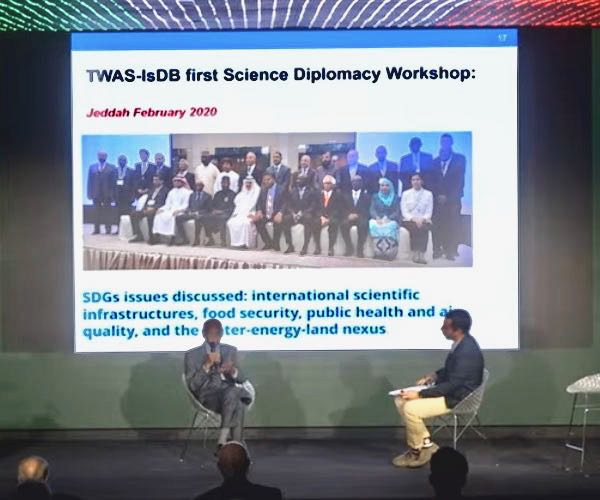
A lot has happened since TWAS was founded, in 1983. The Academy's commitment towards developing countries, however, has remained unchanged and, today, TWAS is recognized worldwide as a vital supporter of the career of gifted scientists from developing countries.
This is how Mohamed Hassan, President of The World Academy of Sciences (UNESCO-TWAS), introduced the Academy to an international audience gathered in presence and online at the Italy Pavilion of Expo 2020 Dubai, in the United Arab Emirates. Hassan was the first speaker in a session dedicated to innovation and sustainable development in the region where Trieste—TWAS host city—is located.
The session—titled "The Friuli Venezia Giulia Research and Innovation Ecosystem: established international partnerships and future potentials"—was held on Friday, 25 February, and introduced by Alessia Rosolen, Regional Councillor for Labour, Training, Education, Research, University and Family. With an average of 7,000 foreign scientists (85 per cent of whom work in science, technology, engineering and mathematics, STEM) permanently living in the territory, and many agreements signed with the Italian Ministry of Foreign Affairs and International Cooperation, including the one that established the Scientific and Innovation System of Friuli Venezia Giulia (SIS FVG), Friuli Venezia Giulia was qualified as a strong innovator by the Regional Innovation Scoreboard of the European Union, both in 2019 and 2021, Rosolen observed.
And in the frame of SIS FVG, TWAS represents a unique reality for its capacity to build international networks and promote talents among countries where science and technology are still lagging.
"In the 66 science and technology-lagging countries identified by TWAS, there are no national funding organizations to support the best research projects," Hassan noted. "This is where TWAS has an impact through its research grants that offer about $1.5 million per year to support young scientists and research groups, and through the over 350 fellowships it bestows every year for postgraduate and postdoctoral students."
Hassan also mentioned the Science Diplomacy programme that TWAS has been developing since 2013, the year in which the Academy organized the first workshop in partnership with the American Association for the Advancement of Science.
"Science diplomacy is a platform that eases scientific collaboration among countries, notwithstanding political differences or international relationships," said Hassan. "Our programme is uniquely structured to offer both a solid scientific background and tailor-made skills to operate in this field."
Hassan mentioned the initiatives that TWAS is carrying out to support refugee and displaced scientists in their relocation process. Thousands of scientists have fled from their countries because of wars and political instability: many of them are outstanding scholars and researchers.
An online workshop about refugee scientists that TWAS organized in 2020, in partnership with the InterAcademy Partnership and the International Science Council was a success.
And in 2021, in partnership with the Islamic Development Bank (ISdB), the Academy launched the "TWAS-ISdB Young Refugee and Displaced Scientists Programme" to help young women scientists displaced by conflict. "It's mandatory that we take care of these people. It takes a while to become a scientist: we must preserve them, for the benefit of their countries and of the whole humanity," Hassan concluded.
Cristina Serra

